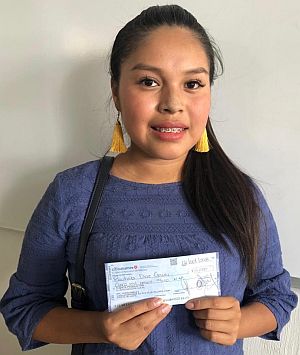Puerto Vallarta, Mexico - This lovely young lady is Geydy Bautista Díaz. She comes from an indigenous community in Jalisco's Sierra Madre mountains where the poverty rate is three times higher than that of the non-indigenous population and where over one third of the children between the ages of six and fifteen work. Geydy, however, is in her fourth year of university in Tepic where she is studying logistics engineering and holds a 9.6 GPA. Amazing!
Geydy and four other Huichol university students, named Isaías, Aquileo, Ángel and Herminio, recently received scholarships of $5,000 pesos each from the Huichol Scholarship Fund of the International Friendship Club (IFC) in Puerto Vallarta, to help support them in their university and college studies. The others are studying forest engineering, electromechanical engineering, financial administration and law, respectively.
How these five students beat the odds and arrived at this point in their lives is a mystery that your humble scribe plans to unravel in the future. The Huichol, or Wixarika, like other Indigenous peoples in Mexico, are very poor. Their home communities in the mountains have worse living conditions, educational and social services than those enjoyed by other Mexicans; and that's saying something!
Huichol usually marry between the ages of fourteen and seventeen and marriages are arranged by the parents when the children are very young. Extended Huichol families live together in rancho settlements, consisting of individual houses built of stone or adobe and thatched with grass. Each settlement has a communal kitchen and the family shrine, called a xiriki, which is dedicated to the rancho's ancestors. The buildings surround a central patio. It's a very simple and rural life.
World-wide, Indigenous students face greater barriers to entering and completing college and university programs than others because they are poorer, tend to have access to inferior primary and secondary education, face more pressure to leave school and work, must leave isolated home communities to attend university in a culturally different community, and are required to study in a second language. So how does someone like Geydy or Isaías wind up studying logistic engineering and forestry engineering? It must take a huge amount of dedication and foresight to do that.
Brian McDougall, who is the IFC member driving this program, was recently asked why these students want to change their lives so drastically.
His answer was, "I can't answer that question for the five HSF students. However, based on a decade of work with indigenous students in Canada, I can tell you that a higher proportion of them, compared with non-indigenous students, are motivated by social concerns, instead of being focused solely on personal advancement. They often have ideas about how they can contribute to the survival and advancement of their communities. One of the five recipients, Isaias, asked for the names of the other recipients because he viewed them as potential members of a team who could cooperate to advance their communities. That's a pretty good indicator of the mind-set many of these students will have."
In the future we hope to find out what role the university trained Huichol students are playing in their communities once they graduate. More specifically, what role they play in defending the Huichol nation from the many threats it faces, including resource extraction projects on their lands; ongoing disputes about their land with governments, companies and local ranchers; increasing presence of drug cartels in their territory, and the loss of community members to cities due to a lack of local employment opportunities.
IFC's mandate includes the enhancement of educational opportunities and these Huichol scholarships certainly fit into that goal. The success of helping these five young Huichol adults is possible only by the cooperation between IFC, Volcanes Community Project, Rotary Club Sur, all from Puerto Vallarta, and the Wixarika Research Centre in San Diego.
More information on the Huichol Indians and the IFC Scholarship Fund, and a discussion of the paradox in our expat community, where we experience the omnipresence of Huichol art and symbols, but know little about their history or current circumstances, will be presented by Brian McDougall at 10:30 am on Friday, January 25th at the IFC for a donation of $80 pesos for IFC members or $100 for non-members.
If you would like to contribute to this scholarship program, please follow THIS LINK, and click "Donate to IFC Scholarship Fund." You will be doing nothing less than changing a life and, maybe, a community. It will help a poor but gifted student beat the odds and make a difference to their world.



